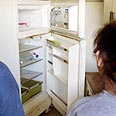
Average income of rich family 14 times that of poor family (illustration)
צילום: ג'רמי פלדמן
OECD: Economic gaps in Israel widening
Document released by Paris-based organization reveals Jewish state once of leading countries in income inequality
Economic gaps in Israel are the widest among all developed countries, according to a new document released by the Organization for Economic Cooperation and Development (OECD), which Israel was admitted into last year.
The report also shows that Israel is a leading country in income inequality.
The document, dedicated to gaps in Western societies, reveals that from the late 1980s to the end of 2010, the average household income of a family of the poorest 20% of the population in Israel dropped at an annual rate of 1.1%, while the average household income of a family of the richest 20% rose an at annual rate of 2.4%.
This phenomenon – the strong growing stronger while the weak become even weaker – has not been detected in any other developed country.
The social gaps in OECD countries have indeed widened, but the average income of a family from the poorest 20% rose by 1.4% and the average income of a family from the richest 20% rose by 2%.
OECD economists note in the document that in Israel the income of a family belonging to the richest 10% is 14 times bigger than the income of a family in the poorest 10%, compared to an average of only nine to one in other OECD countries.
This deep gap puts Israel in the third place in the income inequality list, after Mexico and Chile and alongside the United States. Israel maintains the second or third place when according to other inequality measures as well.
The organization memo ascribes the growing gaps in most developed countries to the ramifications of globalization (cheap workforce in Asia), changes in family formation (ageing population) and tax and benefit policies aimed at easing the tax burden on the rich and cutting the transfer of payments to the poor.
- Follow Ynetnews on Facebook










